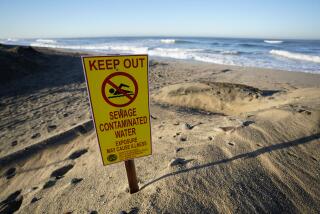UPDATE / BOSTON HARBOR : Campaign Issue Now a $6.1-Billion Cleanup Project : Many were embarrassed by Bush’s criticism. The massive effort is showing results.
- Share via
BOSTON — One of the more notable issues of the 1988 presidential campaign was the horrendous pollution of Boston Harbor. George Bush blamed Michael S. Dukakis, his Democratic opponent, for allowing the harbor to become the dirtiest in the United States.
Today, Bush is President, Dukakis is the lame-duck governor, and the $6.1-billion harbor cleanup, under federal court supervision, is well under way with little help from either of the 1988 presidential contenders.
The Metropolitan Water Resources Agency, created by the Legislature in 1985 under pressure of several anti-pollution lawsuits, is supervising the cleanup--the largest public works project ever undertaken in New England. U.S. District Judge David Mazzone is overseeing the effort.
Major elements of the cleanup plan include upgrading primary sewage treatment plants on Nut and Deer islands in the harbor; building new primary and secondary treatment facilities on Deer Island; building a plant in Quincy to turn sludge into marketable fertilizer pellets; replacing and repairing miles of water and sewer pipes, some 80 years old, and controlling combined sewage overflow systems, pipes that handle both rainwater and sewage.
In the last two decades, when many other cities were rehabilitating their systems, largely with federal funds available under the Clean Water Act, Boston was seeking waivers to save money. Now, federal funds have dried up and state finances are in such a sorry state that Massachusetts has the lowest bond rating in the nation. That means 95% of the costs of cleaning up Boston Harbor will be borne by water and sewage ratepayers, who are beginning to wonder whether federally mandated secondary treatment is worth it.
Annual water and sewer bills are expected to reach $1,200 or more per household by the end of the decade, with a big increase next year, when bills will jump from an average $330 per household to $400.
Chester Atkins, a Massachusetts Democrat who represents a number of communities where water and sewer rates are climbing, last year got a bill through Congress to fund a National Academy of Sciences study of a controversial proposal to treat wastes at the primary level with chemicals, instead of at the secondary level with bacteria.
Paul Levy, who has directed the Water Resources Agency since 1987, said that even if the scientists made a “conclusive finding that secondary treatment is not appropriate,” Congress would be unlikely to change the law to benefit Massachusetts and California. Los Angeles and San Diego also have challenged the need for secondary treatment, Levy noted.
Sheila Lynch, vice president of Save the Harbor/Save the Bay, an environmental advocacy group, said there has been “a noticeable difference” in the cleanliness of the harbor this year. She wants the water agency to keep its secondary treatment plans.
As for the Bush campaign commercial, “People in Massachusetts were embarrassed,” Levy said. The water agency confronted the image problem head-on, preparing a videotape that began with footage of Bush calling it “the harbor of shame.” The agency told institutional investors, “OK, here’s what you think you know about Boston Harbor, and here’s what’s really happening . . . .”
“In a way,” Levy said, “Bush did us a favor . . . . It created impetus.”
Of course, Levy added, “Everybody noticed the inconsistency when he left the money out of the budget.”
In the budget he presented last January, Bush omitted $20 million scheduled to help pay for the cleanup, part of an appropriation arranged by former Speaker of the House Thomas P. (Tip) O’Neill Jr. before he retired. The money was eventually restored in conference committee.
Ratepayers have already seen some results from the increased fees. Boaters and swimmers have reported improvements in the harbor water this year, and there have been fewer beach closings. Some swim in the harbor, and others wouldn’t dare.
Caryl Rivers, a 20-year resident of Winthrop whose back yard ends at the harbor, frequently takes a dip. But she does take precautions. She calls Winthrop Town Hall to find out the latest coliform count before wading in.
More to Read
Sign up for Essential California
The most important California stories and recommendations in your inbox every morning.
You may occasionally receive promotional content from the Los Angeles Times.













